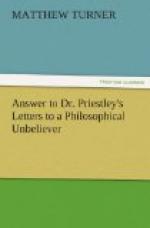8. “The condition
of mankind is in a state of melioration, as far as
misery arises from ignorance,
for as the world grows older it must
grow wiser, if wisdom arises
from experience.”
9. “All moral virtue is only a modification of benevolence.”
10. “Virtue gives a better chance for happiness than vice.”
11. “No instance of any revival.”
12. “Atheists are
not to think themselves quite secure with respect
to a future life.”
13. “Thought might
as well depend upon the construction of the
brain, as upon any invisible
substance extraneous to the brain.”
14. “If the works
of God had a beginning, there must have been a
time when he was inactive.”
15. “Where happiness
is wanting in the creation I would rather
conclude the author had mist
of his design than that he wanted
benevolence.”
FALSE ASSERTIONS.
1. “A cause needs not be prior to an effect.”
2. “If the species
of man had no beginning, it would not follow that
it had no cause.”
3. “A cause may be cotemporary with the effect.”
4. “An atheist
must believe he was introduced into the world without
design.”
ABSURDITIES.
1. “A general mass
of sensation consisting of various elements
borrowed from the past and
the future.”
2. “Since sensation is made up of past, present, and future, the infant feeling for the moment only, the man recollecting what is past and anticipating the future, and as the present sensation must therefore in time bear a less proportion to the general mass of sensation than it did, so at last all temporary affections, whether of pain or pleasure become wholly inconsiderable.”
3. “The great book
of nature and the book of revelation both lie
open before us.”
4. “A conclusion above our comprehension.”
5. “A whole eternity already past.”
6. “Since a finite Being cannot be infinitely happy, because he must then be infinite in knowledge and power; and as all limitation of happiness must consist in degree of happiness or mixture of misery, the Deity can alone determine which mode of limitation is best.”
7. “We have reason to be thankful for our pains and distress.”
8. “If the divine Being had made man at first as happy as he can be after all the feelings and ideas of a painful and laborious life, it must have been in violation of all general laws and by a constant and momentary interference of the Deity.”
9. “It is better the divine agency should not be very conspicuous.”
10. “If good prevails on the whole, creation being infinite, happiness must be infinite, and God comprehending the whole, will only perceive the balance of good, and that will be happiness unmixed with misery.”
11. “If a man is
happy in the whole he is infinitely happy in the
whole of his existence.”




